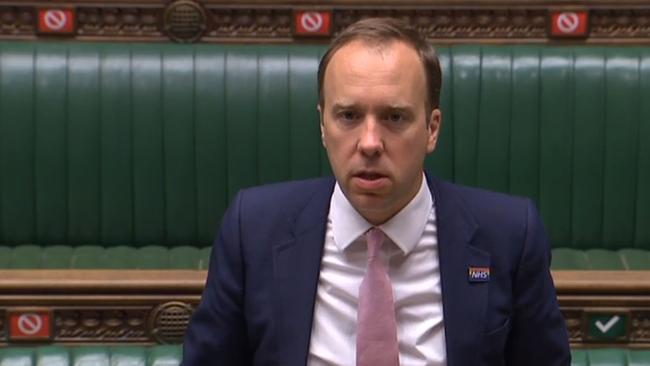Leading scientists claim UK coronavirus death toll exaggerated
Coronavirus deaths have been exaggerated in England, two leading scientists have claimed.

Coronavirus deaths have been exaggerated in England, two leading scientists claim, prompting Health Secretary Matt Hancock to halt the official daily call of the toll.
Mr Hancock suspended the announcement of daily death figures pending a review of how fatalities are tallied amid plummeting trust in the government’s handling of the pandemic.
Oxford pharmacologist Yoon Loke and medical statistician Carl Heneghan found that Public Health England was exaggerating deaths by including those of anyone who had had a positive coronavirus test.
“A patient who has tested positive but was successfully treated and discharged from hospital will still be counted as a COVID death even if they had a heart attack or were run over by a bus three months later,’’ they said.
“PHE’s definition of the daily death figures means everyone who has had COVID at any time must die with COVID too. So, the COVID death toll in Britain up to July 2020 will eventually exceed 290,000, if the follow-up of every test-positive patient is of long enough duration.’’
For some time there has been debate on whether someone dies of COVID-19 or with it, and whether Britain was overemphasising death figures to scare people to stay at home and more recently to wear masks inside shops and on public transport.
The official government website says: “Coronavirus deaths and cases give a sense of the spread of the epidemic. Deaths are counted where a lab-confirmed positive coronavirus test result is reported in any setting. This means that not all deaths reported here are caused by coronavirus.’’
Other countries also have wide interpretations of coronavirus deaths. Sweden includes in their coronavirus statistics anyone who dies within a month of having had the disease. In Britain, COVID-19 deaths are supposed to be measured by adding up deaths as confirmed by a positive test. Separately, the Office for National Statistics has been looking at death certificates, which takes much longer, but this has also been mired in controversy.
In England, the rules were changed so that nursing home executives — who may not be a medical doctor — could attribute any death to COVID-19 without testing. That has led families to complain that their loved ones, many of whom had been long-term cancer or dementia sufferers, have been logged as a pandemic statistic.
In April, the British Medical Association issued official advice giving the green light for doctors to record COVID-19 on death certificates without a positive test.
Latest figures show more than 95 per cent of people who have died in England of COVID-19 had been suffering at least one other significant disease. Government statistics show that 1379 coronavirus deaths in England involved people without co-morbidities. Up to July 19, there have been 29,146 deaths in England attributed to coronavirus.
The practice of PHE workers logging as COVID-19 deaths anyone who has had a positive test — even if they died, say, in a fire or of a drug overdose — is believed to have added at least 4000 deaths to England’s tally, which then feds into the UK coronavirus total of 45,300.
Professors Loke and Heneghan uncovered the flawed count when investigating an anomaly that England was still recording hundreds of daily deaths this month, when Wales, Scotland and Northern Ireland fatalities were in single figures.
“It’s time to fix this statistical flaw that leads to an over-exaggeration of COVID-associated deaths,’’ they said.
PHE incident director Susan Hopkins insisted the inclusion of all those who had ever tested positive on the death figures was to ensure data was “complete’’.







To join the conversation, please log in. Don't have an account? Register
Join the conversation, you are commenting as Logout